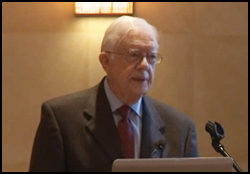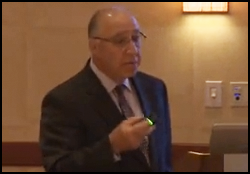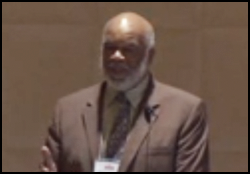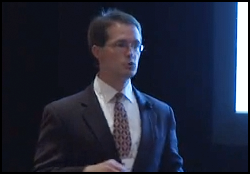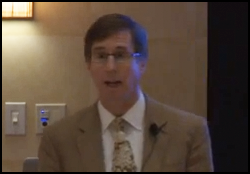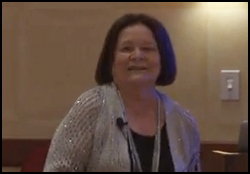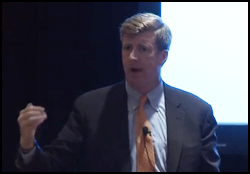How Can States Protect Children from Legal Marijuana?
A Workshop for Leaders whose States Legalized or May Legalize Marijuana
Sponsored by National Families in Action
Co-Sponsored by The Council on Alcohol and Drugs
Georgia Department of Behavioral Health and Developmental Disabilities
Californians for Drug-Free Youth
Washington Association for Substance Abuse and Violence Prevention
Atlanta, Georgia, May 17-18, 2013
This brief video highlights the main points made at National Families in Action’s workshop, co-moderated by the organization’s senior advisor, Kent (Oz) Nelson, and board chairman, Bill Carter.
Former President Jimmy Carter tells participants, "I do not favor legalization. "We must do everything we can to discourage marijuana use, as we do now with tobacco and excessive drinking. We have to prevent making marijuana smoking from becoming attractive to young people, which is, I'm sure, what the producers of marijuana....are going to try and do."
Wake Forest University School of Medicine professor David Friedman, Ph.D., says "adolescence is a critical period of brain development and marijuana use has profound effects on brain development. Chronic use impairs short-term memory, atten-tion, executive function, decision-making, learning, and in vul-nerable individuals can produce psychosis, including schizo-phrenia."
Treatment Research Institute founder/director and former deputy director of the White House Office of National Drug Control Policy Tom McLellan, Ph.D., says 23 million Americans are addicted to alcohol or other drugs, while 40 million engage in harmful use and are defined as having a substance abuse dis-order (SUD). He adds that the treatment system for drug addiction is built on a false model (you become addicted, you get treated, you're "cured"). Instead, addiction is a chronic condi-tion like diabetes or hypertension and must be medically man-aged long term.
Duke University School of Medicine professor, Rochelle Schwartz-Bloom, Ph.D., cites a number of recent studies report-ing that adults who start smoking pot before age 18 are signifi-cantly more likely to have cognitive problems (including a drop in IQ), anxiety and psychotic disorders, and testicular cancer."
Adewale Troutman, M.D., MPH, president of the American Public Health Association, says that "Like President Carter, our association also opposes the legalization of marijuana.” He says he worries that a commercial marijuana industry will saturate poor and minority communities with advertising the same way alcohol and tobacco companies saturate them.
Carnegie Mellon University Heinz College professor Jonathan Caulkins, Ph.D., lead author of Marijuana Legalization: What Everyone Needs to Know, predicts the uncertain future of legal marijuana: production costs will fall sharply; taxes cannot offset the decline in price; the "exports" market could be 50 times greater than in-state sales; more states will legalize; and time will prove at least some of his predictions wrong.
David Jernigan, Ph.D., associate professor at Johns Hopkins Bloomberg School of Public Health and director of the Center on Alcohol Marketing and Youth, cites lessons learned from alcohol that can be applied to marijuana, including 1) don't let governments get drunk on revenues, 2) build a control system based on the three "best buys" of economic availability via high taxes, social availability via constraints on marketing, and physical availability via licensure or monopoly systems, and 3) control the size and power of the industry.
National Families in Action president and CEO Sue Rusche traces the history of the ways the tobacco industry has targeted children as potential lifetime customers, noting that the Altria Group, the nation’s largest cigarette manufacturer, has diversified and acquired Chateau St. Michelle, the nation’s largest producer of Riesling wines. If Congress resolves the conflict between federal and state law, she asks, will the tobacco industry further diversify and acquire the legal marijuana industry?
University of Virginia Law School professor Richard Bonnie, L.L.B., stresses that advertising and marketing restrictions on legal marijuana are not only possible but prudent. "Promoting marijuana is contrary to public policy. Do NOT concede that the First Amendment ties your hands unless and until the Supreme Court says so."
National Families in Action president and CEO Sue Rusche compares alcohol use with marijuana use across the lifespan and asks if we really want to regulate marijuana like alcohol. She introduces the organization’s 12 provisions designed to pre-vent a commercial marijuana industry from targeting children as potential lifetime customers, like the tobacco and alcohol indus-tries do.
Former Congressman Patrick Kennedy and former Obama administration drug policy senior advisor to the director Kevin Sabet, Ph.D., present Project SAM (Smart Approaches to Marijuana) as an alternative marijuana policy. SAM charts a middle road between marijuana incarceration and legalization.




